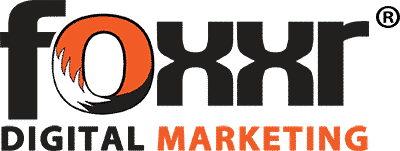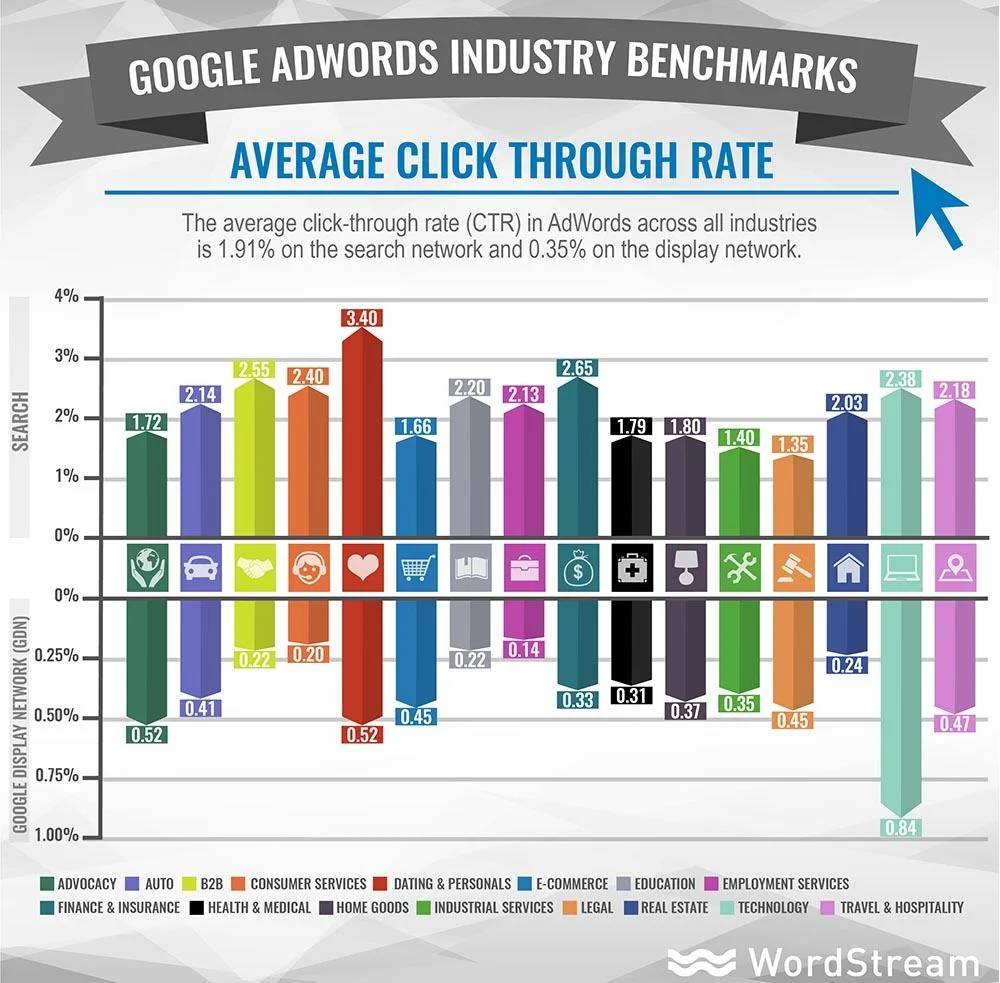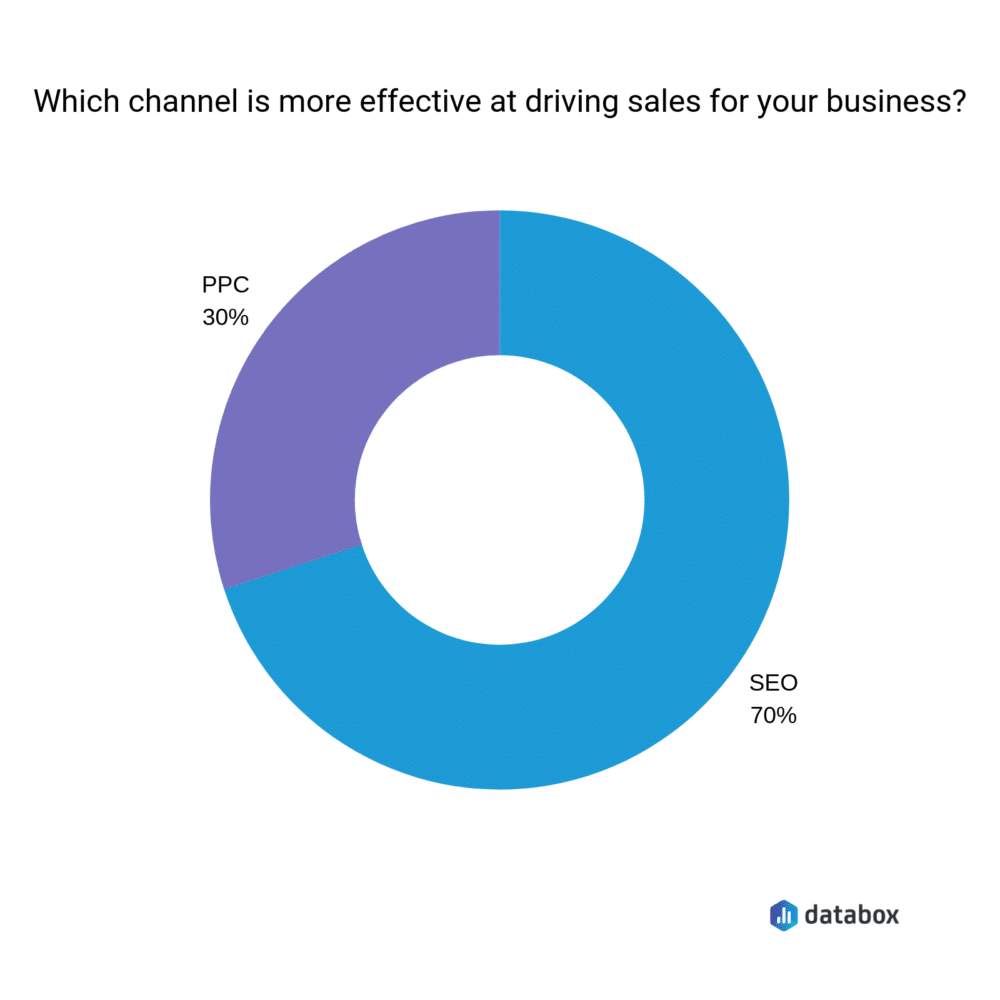SEO vs. PPC: Which One Has Better ROI
Share this Article
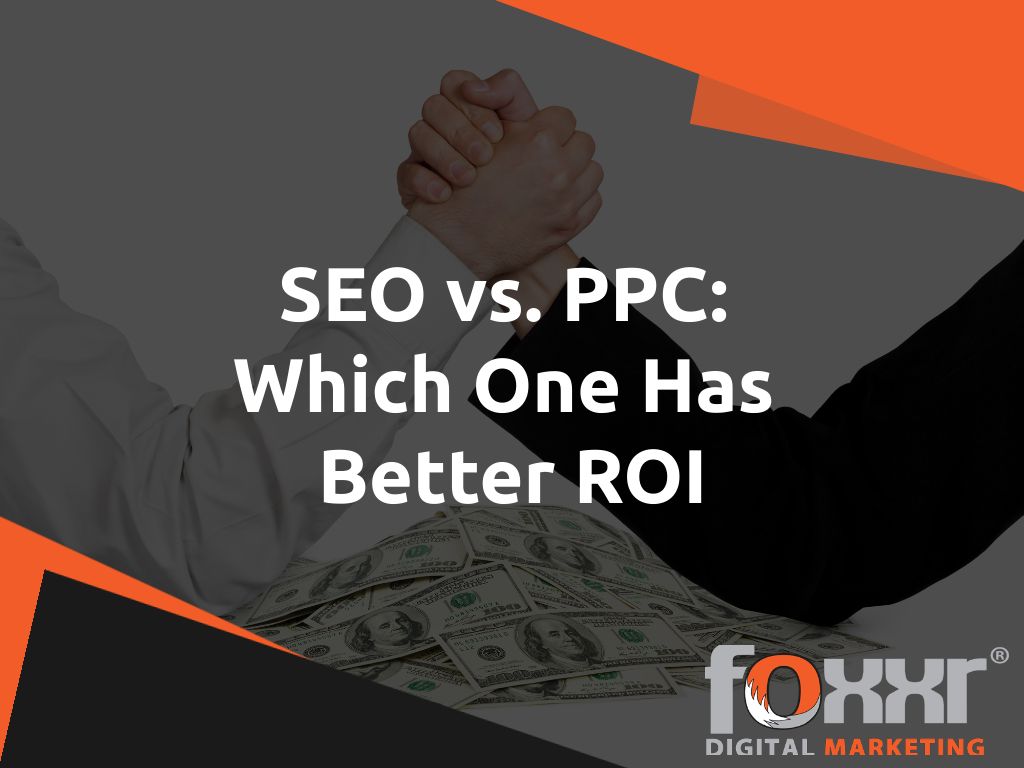
Companies must invest in digital marketing strategies that increase brand awareness and boost website traffic in today’s highly competitive business world. However, with so many different digital options to choose from, it can be challenging to decide which strategy is the best investment.
This post will discuss two of the most popular and practical areas of digital marketing: SEO vs PPC.
On average, businesses spend 40 to 80% of their marketing budgets on SEO and PPC – since both can be highly effective in driving website traffic. But which one will give you the best return on investment (ROI)?
Let’s discuss.
What is SEO?
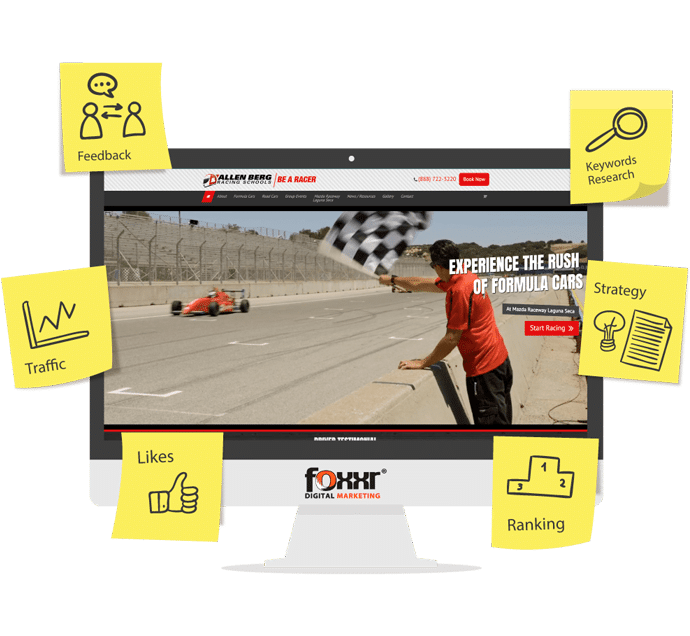
Search engine optimization (SEO) is the process of optimizing websites and web pages to rank in the organic (non-paid) results of Google, Bing, and other search engines.
It consists of several tactics, primarily keyword research, on-page optimization, and link building. When done correctly, SEO can increase the number of visitors to your site, which leads to increases in brand awareness and sales.
Search engines like Google are hungry for high-quality content to deliver to users. So, businesses need to create valuable and informative SEO content that engages relevant searchers and potential customers.
Pros of SEO
Let’s look at the advantages of using an SEO strategy:
1. Organic Traffic Has Staying Power

Source: search engine land
One of the most significant advantages of SEO is that the traffic it generates is organic – which produces 53% of all website traffic. Organic traffic comes from people actively looking for your products or services instead of those exposed to your ads.
Additionally, organic traffic continues to flow even after you stop investing in SEO. In other words, once you achieve top rankings for your target keywords, your website will continue to receive traffic from them – as long as you maintain your SERP positions. This contrasts with pay per click, where you need to keep spending money on ads to maintain visibility and traffic levels.
2. Raises Brand Awareness
In the long run, optimizing your website for search engines will help increase your brand awareness. Consistently creating quality, keyword-dense content will eventually improve your SEO rankings and result in more people finding your website through Google and other search engines (ideally).
Brand awareness is the first step in generating leads and sales. Once customers know your brand, they are more likely to do business with you.
3. Builds Your Credibility

Source: sistrix
Another advantage of SEO is that it works to improve your site’s credibility.
When your website (or a page on your website) ranks high on search engine results pages, it builds credibility and drives traffic among your target audience. In fact, the click-through rate for websites in top SERPs positions is approximately ten times higher than those on the second page of search results.
A high ranking on SERPs shows that you’re an authority in your field and trusted by search engines to provide relevant, helpful information. This added credibility can help improve your sales conversions and customer loyalty over time.
4. Cost-Effective
SEO is one of the most cost-effective digital marketing strategies available. The average cost for SEO services in the US is between $2,500 and $5,000 per month. While this may seem high, it’s a small price to pay for the long-term, free traffic/conversions you’ll achieve.

Cons of SEO
Now, let’s look at some of the pitfalls of SEO:
1. Highly Competitive
Depending on the keywords/industry, SEO can be extremely competitive – as you’re essentially competing against other websites for the top spots in search engine results pages. This can be challenging, especially when targeting a high-traffic keyword/phrase or going up against well-established websites.
Thorough research is essential to find the right keywords that will bring in the most traffic and conversions. So, be ready to invest significant time and effort into your SEO strategies to rank higher than your competitors.
2. SEO Strategies Need Frequent Adjustments
The SEO landscape is constantly changing as search engines tweak their algorithms and new techniques emerge. In fact, Google’s search algorithms use hundreds of different factors to rank websites and web pages.
For this reason, you need to keep an eye out for new developments and use them in your SEO campaigns. Otherwise, you could quickly find yourself falling behind the competition. You can keep your campaigns up-to-date by outsourcing your SEO services to a digital marketing agency.
3. Requires Unique Content
One of the key signals search engines use to rank websites is the quality and relevance of their content. This means you’ll need to produce original, engaging content if you want to rank well in search engine results pages.
Additionally, since SEO is an ever-changing field, you’ll need to update your content now and then to stay ahead of the competition. Creating compelling content is the most time-consuming aspect of digital marketing, especially if you manage your SEO strategies in-house.
4. Organic Results Take Time

Source: ahrefs
SEO results won’t happen overnight. It can take 6 to 9 months of consistent effort to see significant improvements in your search engine rankings. However, if you’re willing to put in the work and time needed to create an effective SEO strategy, you can achieve long-term success.
What is PPC?
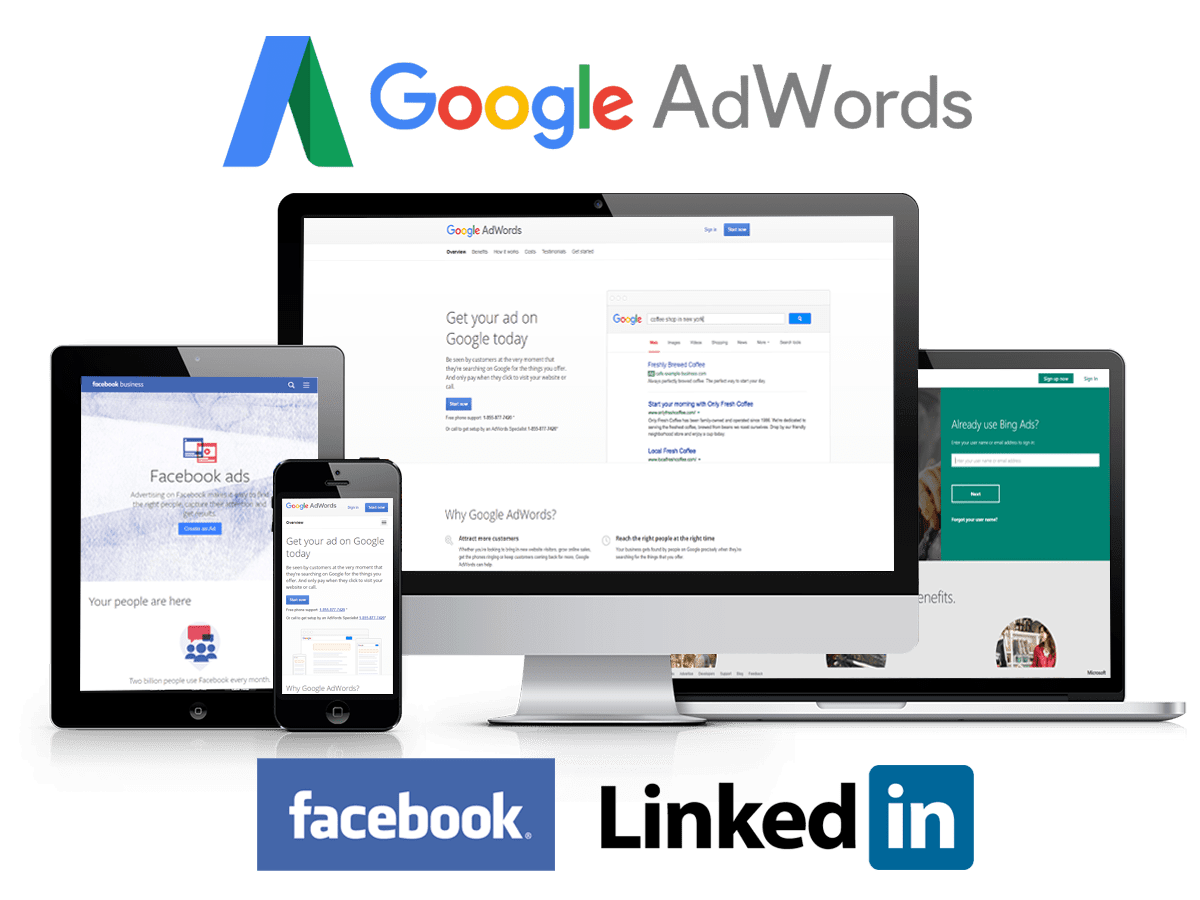
Pay-per-click (PPC) is an advertising model where you pay a search engine for each ad click that takes users to your website.
PPC allows you to leverage search engine traffic by bidding on specific keywords and phrases. You then pay the search engine each time someone clicks on your ad. The cost of each click varies, depending on the competitiveness of keywords and the budget you set.
Pros of PPC
Here are the advantages of using a PPC strategy:
1. Pinpoint Your Target Audience
PPC allows you to target specific audiences based on location, topic, demographic, interest, etc.
For example, you can target people based on what they’ve searched for on Google, where they are located, and even their age and gender. This level of targeting ensures that your ads are seen by the right people, increasing your chances of converting them into customers.
2. Offers Quick Results
PPC is one of the quickest ways to generate leads and get your website in front of online users.
While it can take months to see results from an SEO strategy, PPC through Google Ads and other platforms gives you the ability to see results in as little as one day. This makes it ideal for businesses that need results now.
3. Allows for Quick A/B Testing
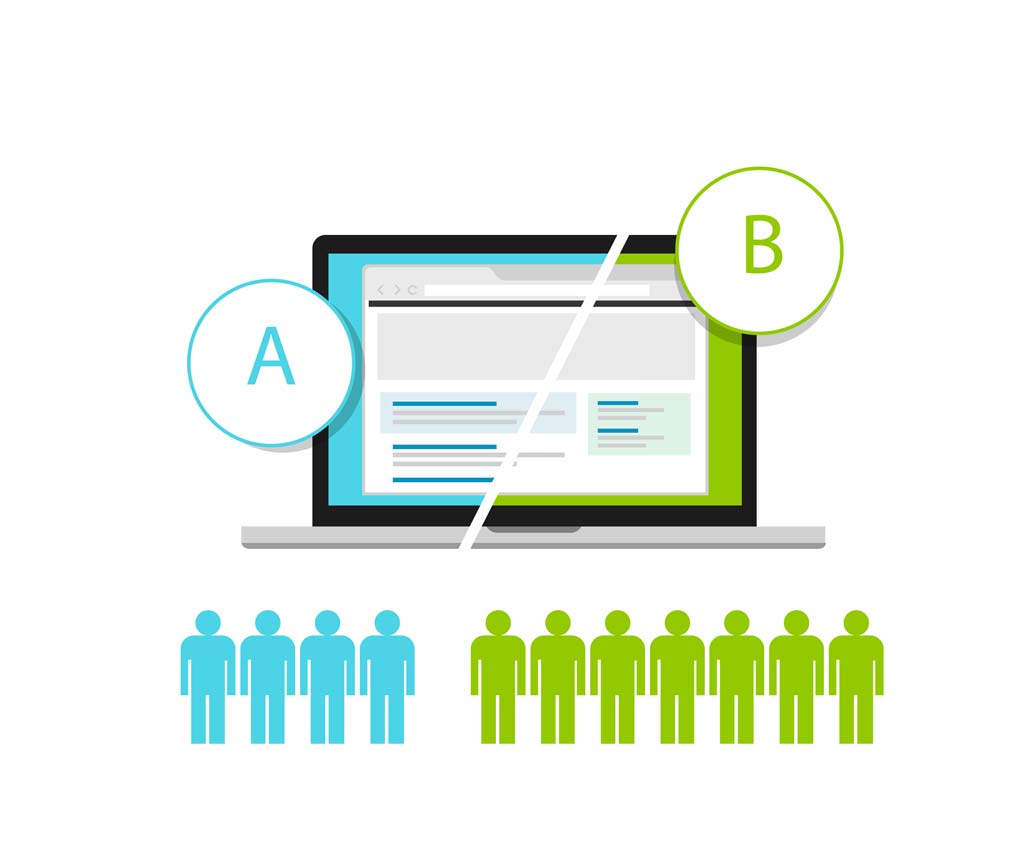
A/B testing is a process of experimentation that allows you to test different versions of your website or ad to see which one performs better. With PPC, you can quickly test different versions of your ads to see which ones generate more clicks and conversions. This allows you to optimize your campaigns for more clicks continuously.
4. Appears Above Organic Rankings
PPC ads are usually the top listings in search engine results pages. This means that you don’t need to worry about your PPC ad being lost in a sea of organic results that searchers never notice. Instead, your ad will be front and center where it can grab the attention of potential customers.
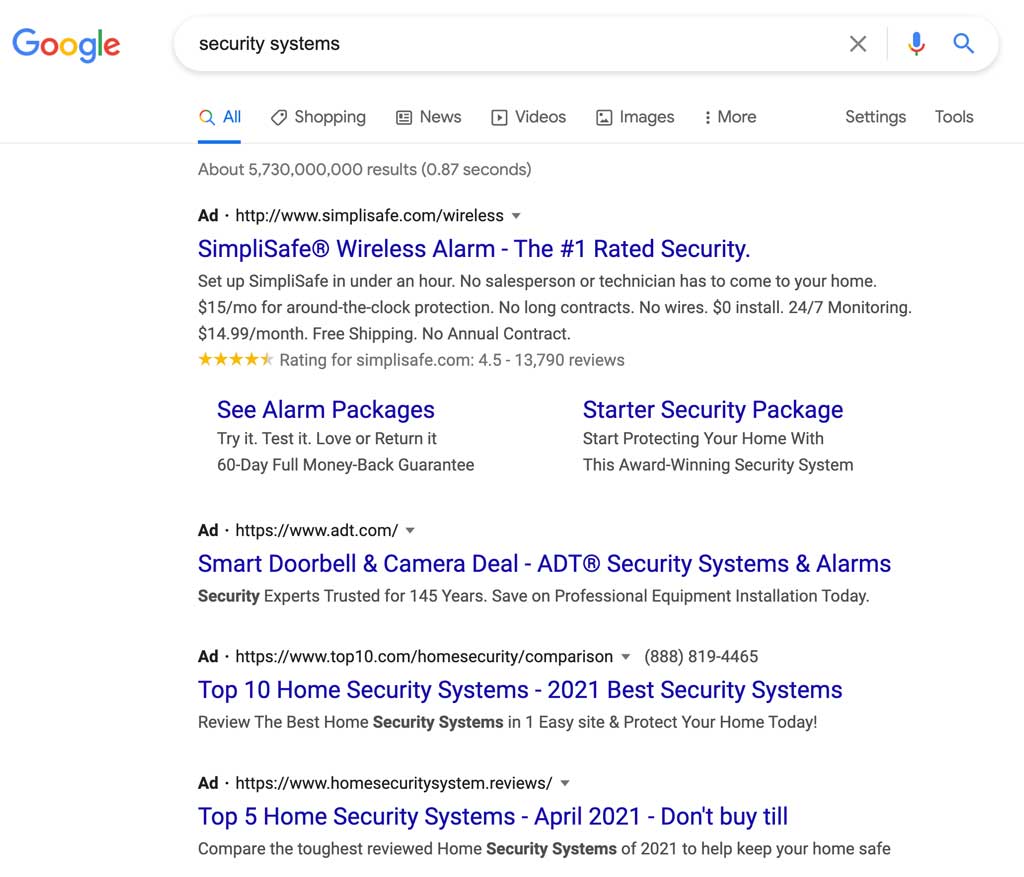
5. Budget Control
The first step to making your PPC campaign is setting a budget. This will help you stay on track and not overspend, as well as make sure that the ads are set up correctly for maximum efficiency!
The money spent here should reflect what works best in order to achieve your desired results.
6. Marketing Intelligence
Organic keyword data is generally hidden to preserve privacy. With PPC, there are no such restrictions. Conversion tracking and analytics integrations – like Google Analytics – give marketers a data-driven view of which keywords convert, the percentage, and the cost. These insights can then be used to understand the value of organic search – and other forms of digital advertising across the board.
Cons of PPC
Now, let’s look at some of the downsides to using PPC:
1. Can Be Very Expensive Depending on the Keywords
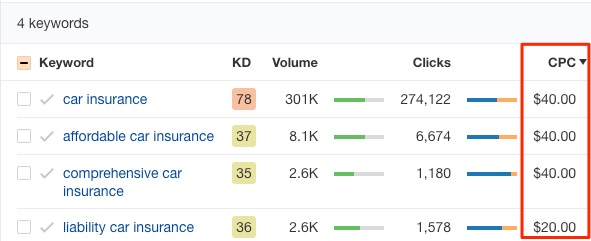
Source: ahrefs
PPC advertising can be expensive, especially if you’re targeting high-traffic keywords. Monthly PPC ad costs, on average, can be between $5,000 to $9,000 a month. Therefore, it’s important to have a well-planned strategy in place to see a positive ROI. Otherwise, you could quickly burn through your advertising budget with little to show for it.
2. Challenging to Maintain
Once you’ve set up a PPC campaign, it takes time and effort to maintain it. You’ll need to continuously track your ads to ensure they perform well and make changes as required. Otherwise, you could end up spending a lot of money on ads that don’t bring in any return.
This can be a lot of work, especially if you have multiple campaigns running simultaneously.
3. Clicks Do Not Guarantee Sales
While PPC ads can generate a lot of clicks, not all of those clicks will result in sales. The average conversion rate for PPC ad clicks generally falls between 2 and 5 percent.
You may see an increased number of visitors to your website with PPC — however, you will need to optimize for conversions if you want them to turn into customers. This involves using call-to-action buttons and smart landing page design to convince users to take the next step.
Which is Better for My Business: SEO or PPC?
Now that we’ve looked at the pros and cons of SEO vs PPC, it’s time to decide which is best for your business. Of course, neither is inherently better than the other – it really depends on your specific business needs.
To help you decide, let’s look at a few situations in which one might be better than the other:
1. PPC – You’re Promoting an Innovative Product or Service
In order to generate organic traffic from search engines, your website content needs to be well-researched and keyword-rich. Yet, if your product or service is new and there isn’t much existing content online, you may find it difficult to rank in search engines.
Therefore, if you have a completely new or innovative product or service, PPC might be the best way to get your business noticed. You can target specific keywords and create ads for your product/service pages that will help you stand out from the competition.
2. PPC and SEO – You Want to Build Brand Awareness
SEO is a great way to increase your presence online and develop loyal customers. It takes some time, but with diligent SEO tactics, you can create content that will establish your company as an authority in the industry.
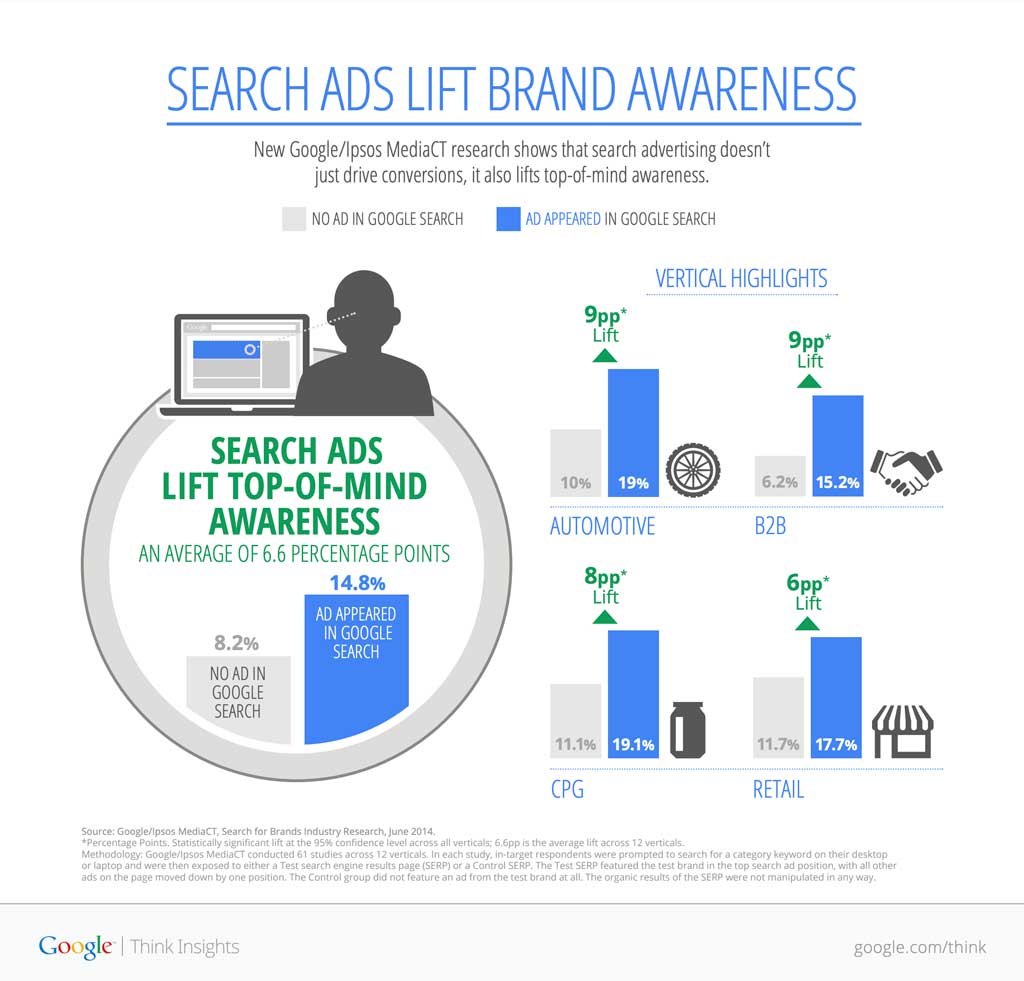
On the other hand, if your business wants to get its name out there while it’s still new, PPC may be better suited for you because of its instant gratification. Again, this tactic enables you to immediately capture the attention of potential customers via ads and offers.
3. PPC – You Want Very Targeted Customers
SEO is best used to reach large audiences. This means it’s ideal for businesses with informational content that appeal to a general audience (e.g., loans, insurance).
SEO will help you connect with a wider range of consumers who are actively looking for what you offer.
Paid search marketing works best when targeting very specific audiences. So, if your business offers unique products or services that only cater to small segments of the population, using PPC will help you reach these more targeted customers.
4. SEO – You’re Promoting Informational Content
A big difference in SEO vs PPC is how you measure ROI. Are you looking to make a fast sale or build long-term brand awareness?
From what we’ve seen, search engine algorithms have changed a lot over the years to prioritize informational content over transactional content in the organic search results. This is likely to get businesses to spend more on PPC ads.
That said, if you’re trying to promote a product page or a service that has a direct monetary conversion, PPC will likely be more effective. On the other hand, SEO is the better option if you are looking to build industry authority with an informative blog post or guide.
Benefits of Using SEO and PPC in Tandem
If you’re looking for a comprehensive digital marketing strategy – where you need both fast and long-term results – using SEO and PPC together may be a great option. Since both methods can be effective on their own, using them together can help you achieve your business goals even more quickly.
Here are a few benefits of using SEO and PPC in tandem:
1) Increased Reach – By combining the strengths of both SEO and PPC, you can reach more potential customers than you would if you used either tactic alone.
2) Greater Visibility – Ads created through PPC will help to improve your brand visibility, while organic search results will position your website as a thought leader in the long haul.
3) Increased Leads and Conversions – The combination of SEO and PPC will lead to more leads and conversions for your business than using the tactics exclusively.
4) Greater Control – With both SEO and PPC, you have greater control over how your website appears on search engine results pages, which can help to improve your click-through rate.
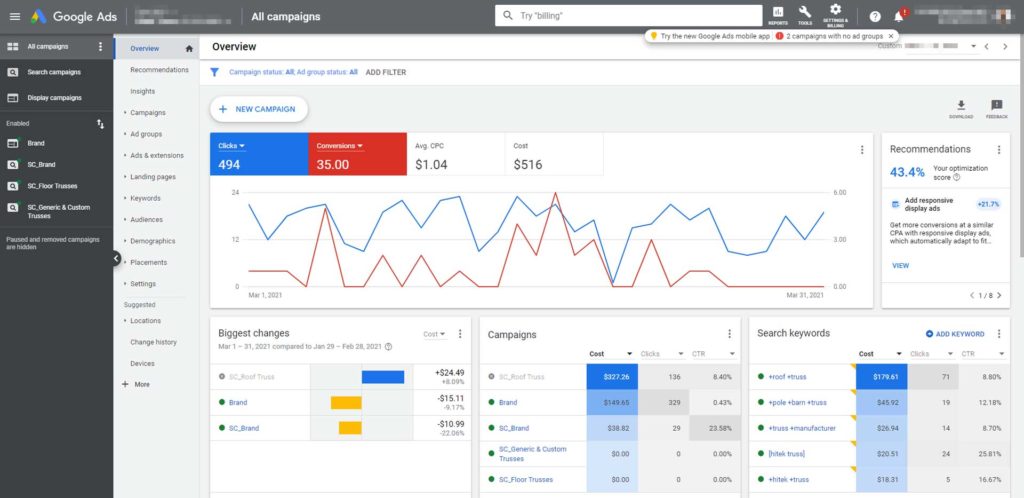
Overall, using SEO and PPC in tandem can be an extremely effective way to improve your marketing results.
Over to You
As you can see, PPC and SEO are both effective digital marketing methods. Yet, while both can be useful for your business, not every marketing strategy will work well in all situations.
Therefore, it’s essential to understand how each of these tactics works and which digital marketing strategy would best suit your needs. With a good idea of what you want to achieve from your digital marketing campaign, you’ll have an easier time determining whether SEO vs. PPC is right for you.
Partnering with a digital marketing agency will help you identify which method is suitable for your business. The experts at Foxxr Digital Marketing Agency will help you run a successful PPC campaign or perform impactful SEO work to reach your goals in the coming year.
To learn more about our services, contact us today!
